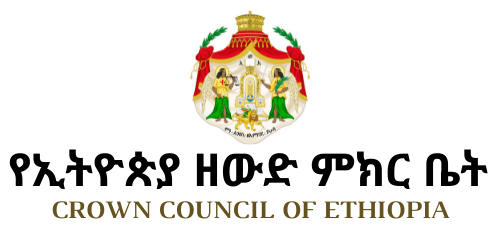እሁድ, ታኅሣሥ 28 2016 / 7 January 2024
SPEECHES & ARTICLES
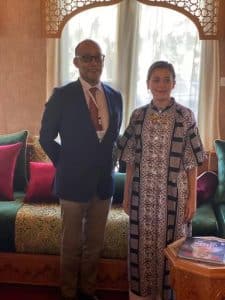
Prince Ermias Sahle-Selassie, President of the Ethiopian Crown Council, gave the following speech in Panama on January 7, 2024. Speaking to the press, Prince Ermias stated, “I would like to thank the organizers of this meeting, Rastafari Ancient Living Arts and Kulture, and the Rastafarian community who are in attendance today from different parts of the world. My special thanks to Ras Sela.”
Ladies and gentlemen, thank you. It is a pleasure to be back in Panama. In May 2022, I attended a series of events here focused on the need for a journey of atonement and reconciliation, and a reunion between Mother Africa and its diaspora. I gave a speech during one of those events on the subject of colonialism. At the time, I told our audience that “we have decolonized our countries. We must now decolonize our minds.” I invited the people I was speaking with to “think about the priorities we see take center stage in Africa today. Think about the values that drive our young people today. And ask yourself whether these are really our own values, or whether they have been imposed on us from the outside.”
I would like to elaborate on that theme in more detail today. I have lived in exile since a young age, and I have raised my children, my two sons, in what is still to me a foreign land. My exile is their home. I see how large the gap can become in one generation between the values of our forefathers and the values of our children. I see how quickly our churches, our traditions, our languages can become foreign to our own people. But this does not happen simply in exile, simply in diaspora. It happens in our home countries as well. It happens in my own homeland, which escaped European colonization but has spent much of the last 50 years fighting itself and its neighbors. And for what?
Look at the crisis of government, not just in Ethiopia, but across Africa. Look at the values that drive us ever further away from our cultures and traditions. Today, we treat life as a competition. We treat access to public resources as a zero-sum game. We treat holding high office as nothing more than a means to take from other people so that we can give to our own. This is the model colonialism imposed upon us, and it is a model we have chosen to retain even as we have discarded the political bondage which came with it.
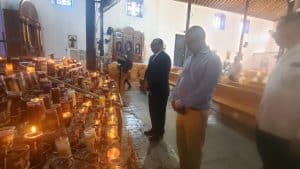
We need to cast this model aside. We need to build a model of unity and cooperation. We need to teach our children the economics of collaboration: when any country – in North or South America, in the Caribbean, in Africa – when any country’s people can enrich itself, the whole world enriches itself in the process. A microloan in Kingston can help to grow a business one year that is buying exports from Accra the next, exports which in turn can spur manufacturing demand for oil from Angola or precious minerals from Ethiopia. We must always remember that the smallest economic actions can have long-term consequences far bigger than we might imagine.
I have tried to model that philosophy in my own work in Ethiopia. This has not always been easy. People often approach me with ambitious goals far in excess of my ability to provide anything more than moral support. But I take pride in the lives we have changed. Twenty-five years ago, I was able to sponsor full four-year college scholarships in the United States for two dozen Ethiopian students who would not otherwise have been able to afford them. Today, those two dozen men and women are successful adults, with advanced degrees, with families and businesses of their own. Just last month, I worked with a major donor to secure food aid to a pre-school in a poor part of Addis Ababa, Ethiopia’s capital. Studies have long shown that students who go to school hungry cannot learn effectively. And today, hundreds of pre-schoolers will start their education on a full stomach for the first time. I hope those pre-schoolers grow up knowing that someone halfway around the world helped them, and I hope they in turn will be able to do something comparable, in Ethiopia, in Africa, in the world.
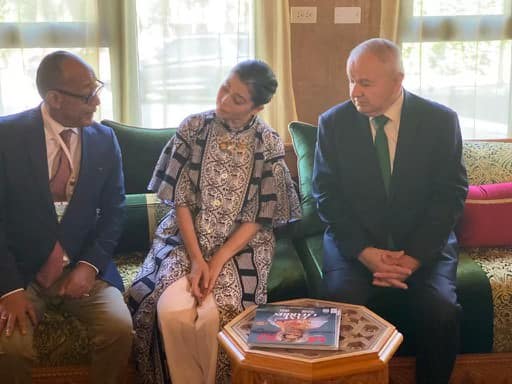
This spirit of unity and cooperation I want to urge upon everyone was at the heart of my grandfather’s work. Sixty years ago, Emperor Haile Selassie brought over 30 African nations together in Ethiopia to form the Organisation of African Unity, with the explicit goal not only of unity but of lifting all Africans out of poverty and fostering a spirit of peaceful cooperation instead of violent confrontation. This was not always an easy task: Africa’s first generation of postcolonial leaders had their philosophical differences, and still, foreign powers played global chess games with long-term negative consequences for Africa’s economic development. This is not a new problem. Indeed, it is one with deep roots.
The history of Africa’s people in recent centuries is unlike that of any other. In 400 years, the trans-Atlantic slave trade took as many as 12 million Africans out of Africa against their will. I do not think any other continent has seen such a wrenching involuntary dislocation of such a high percentage of its population in history. This forced relocation has always left a void in the African heart, a hole waiting to be filled. The African Union recognized modern fact born out of ancient tragedy, and in 2008, designated the African diaspora as Africa’s sixth region, and moved to open AU institutions to participation by that sixth region. There is now a movement to create a formal governance structure for the sixth region, to create a truly global borderless nation, to offer citizenship in the sixth region to all of Africa’s diaspora.
But for the sixth region to realize its full potential, we must build it as something more than a political and bureaucratic entity. To develop Africa to its full potential, and to develop the African diaspora to its full potential, we need to create cultural, philanthropic, and economic unity. How many times in my life’s work have I discovered other people pursuing overlapping goals? I worked to bring clean-water systems to Ethiopia, and only by accident discovered a number of future friends and colleagues working on clean-water initiatives in other regions. I worked on a collaboration to digitize ancient manuscripts in Ethiopia, but was able to do so only because I had access and connections that similar projects lacked. My organization’s contribution to food aid in Ethiopia is only one of many. How much inefficiency do we create, how many opportunities do we miss, by duplicating our efforts or by ignoring potential synergies?
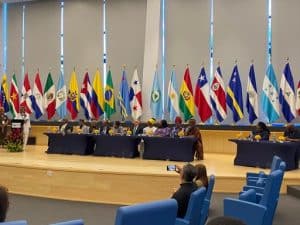
It is futile to work within separate groups. Yes, we must take small steps before building a larger vision. But all of our separate organizations and all of the small steps they take will become infinitely more effective if we open our doors and work together. I challenge everyone working in Africa and in its Caribbean diaspora to organize in cooperation with one another. I challenge every NGO, every civil-society organization, every non-profit and charity, every micro-investor and impact-investor to form a larger sixth-region collaborative. Every one of us in these fields should embed collaboration with other organizations into our institutional framework. Remember what I have just said about treating access to resources as a zero-sum game. If we want to give food aid, if we want to bring clean water, if we want to give micro-loans to young entrepreneurs, we take nothing away from the men and women already doing that work. We add to that work.
And so I challenge all of us to return to our communities, our organizations, our families, and begin a process of cooperation rather than competition, a process of opening doors and forging new ties. Panama is a symbolic place to begin this process. This country is a bridge between two continents, one foot in North America, one foot in the South. This country is also the gateway between two great oceans, its canal the most important road between the Atlantic and the Pacific. This country’s people are like the country itself: your ethnicities unite the world. Your native peoples, your European and mestizo groups, your Africans in diaspora, show the entire Atlantic coming together to form a single whole. We must, like the land and people of Panama, become one, and become the roads and bridges to unite our peoples and our lands.
To my fellow Africans and members of the diaspora, I would like to close with a reminder of our place in history. Africa is the source, the origin of human civilization. It has been a creator of vast wealth for the people of other continents. Africa subsidized Europe for 500 years. Africa subsidized the United States of America for hundreds of years. Africa has subsidized China for 50 years and counting.
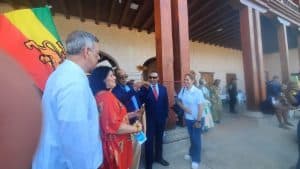
We need now to focus on building our own wealth and prosperity. I believe this process will gather momentum in 2024, will reach new heights, will create new unity, will create new vision in action, and will create results, and then results, and then results. As Africans nation after nation come to believe in themselves, as they go beyond sustainability, as they go beyond mere mid-level wealth, they will create super-wealth generated by Africa, in Africa, through Africa, for Africa and for export.
To all Africans everywhere, I say that you are bright and shining stars in the firmament of knowledge and understanding. You are the ones who will bring balance to the world order, in peace and unity. May Africa this year start sending official foreign debt outbound to Europe, to Asia and elsewhere. May Africa arise to achieve the dignity and peace that is its birthright. May it be the harbinger of good news in the New Year.
Africa has risen. Africa is contributing to the world. Africa is not a receiver any more, God forbid, a beggar. Africa is a leader, a contributor, a producer, a generator of wealth and culture and arts and all the greatness that belongs to humanity. May Africa, unlike what people have expected, rise peacefully and never indignant, never in anger, never in any fighting spirit, but by the quality of our own talents.
Because Africa has talent. Africa has the human capital; it has the mineral capital; it has the social and cultural capital; and music and arts and sciences. Africa will lead the world spiritually, materially, scientifically. May this vision of Africa not be a vision alone. May it be a reality in the elevation of African nations by African spirit. Africa, shine, and show to the world who you are. We will see to it that the exaltation and glory of Africa will be restored, will be manifested, in peace, in unity and in service to the entire world.
Thank you.
